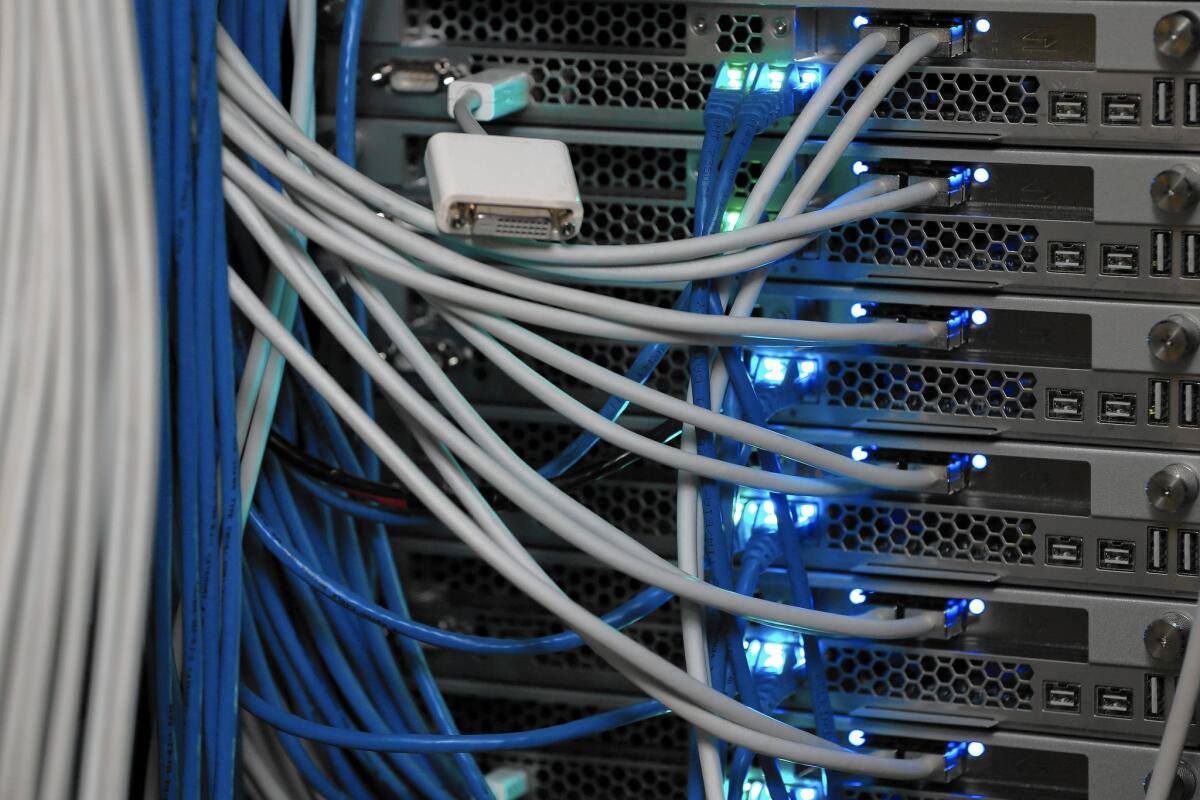Do you trust telecom industry? That’s why we need open Internet

Be honest now: Do you trust big businesses to play fair when they issue credit cards or loans? Do you trust them to release only safe products, to protect the environment, to follow all financial rules and to act in the best interest of society?
Thank you.
That’s a big reason why companies and marketplaces need oversight.
And that’s why President Obama called Monday for the Internet to be regulated like any other public utility.
It’s not about bureaucratic overreach. It’s about making sure the ever-dwindling number of companies that control the nation’s data networks don’t abuse their immense power over a resource that has grown indispensable to the economy, politics, education, healthcare and entertainment.
The fact that those very gatekeepers to the Internet immediately declared their opposition to greater competition and transparency should be enough to give consumers pause.
Verizon Communications said treating the Internet similarly to necessities such as water and electricity is likely to cause “great harm” to the marketplace and businesses. It said the company favors a “light-touch regulatory approach.”
AT&T said regulating broadband networks like a public utility would do “tremendous harm to the Internet and to U.S. national interests.”
Time Warner Cable said such regulation would “create unnecessary uncertainty, lead to years of litigation and threaten the continued growth and development” of broadband networks.
Not to belabor the point, but those are some of our biggest phone and cable companies talking. Is there a single person reading this who’s never had a bad experience with either industry?
Is there anyone who thinks that phone and cable companies, if left to their own devices, would consistently treat customers fairly and make sure people are offered the best possible service at the lowest possible price?
Not surprisingly, the telecom industry’s knee-jerk, sky-is-falling response to the president’s words blew the entire matter out of proportion. Obama isn’t calling for the digital masses to rise up and seize the means of network production.
All he’s saying is that the Federal Communications Commission should have the authority to make sure that telecom companies keep the Internet open and accessible to all and to make sure that no business behemoth — a Netflix, say, or Amazon.com — can shell out big bucks for fast-lane preferential treatment.
In policy-wonk terms, what Obama is saying is that the FCC should reclassify the legal standing of broadband network providers. Since 2002, these networks have been deemed to be an “information service” that falls under Title I of the Communications Act.
The FCC has only limited authority to oversee such services, which is how the telecom industry likes it.
If broadband networks were reclassified as so-called Title II services, the FCC would have the authority to make sure companies act “in the public interest” and “promote competition in the local telecommunications market.”
Specifically, Title II status requires that telecom companies can’t make “any unjust or unreasonable discrimination in charges, practices, classifications, regulations, facilities or services.”
Now you see why the likes of Verizon and Time Warner Cable have their corporate knickers in a twist. Title II reclassification, which is what Obama is seeking, would require that they maintain a competitive marketplace and not screw over any customers.
Craig Aaron, head of the digital-rights group Free Press, pointed out that Obama isn’t going rogue on this issue. The FCC, he said, has received about 4 million messages from Internet users, “with the overwhelming majority of comments urging the agency to create real net neutrality protections.”
Network neutrality means that all Internet users — from content providers to consumers — would have equal access to networks with no favoritism or discrimination shown by telecom companies.
This is complex stuff, with acres of legal and technical weeds to get lost in. That’s why the telecom industry is threatening lengthy and expensive litigation.
But the reality is that no one’s calling for the FCC to impose regulations on these companies that would hamper growth or innovation.
Corynne McSherry, intellectual property director for the Electronic Frontier Foundation, said some Title II rules were drafted for 20th century phone companies and “don’t make sense for broadband.” The FCC should steer clear of unnecessary rule-making, she said.
“This is an important moment in the fight for the open Internet,” McSherry said.
There will be some who will have an allergic reaction to any proposal for increased government oversight of the private sector. They’ll point toward the Internal Revenue Service or the Department of Motor Vehicles and say, “Do you want more of that?”
No, of course not. What Internet users do want, though, is the peace of mind that comes with knowing that what’s become an essential public resource is operating in the best interests of the public.
There’s a reason that when you turn on your faucet, the water is clean and safe to drink. There’s a reason that the food you buy in the supermarket is safe to eat — or, if not, is quickly pulled from shelves — and that the products you buy have to meet clear standards intended to prevent harm or injury.
It would be easier to give telecom companies the benefit of the doubt if they’d spent years earning and maintaining our trust. However, that’s not the case.
In its statement Monday, AT&T warned that Obama is seeking nothing less than “government control of the Internet.”
He isn’t, nor is anyone proposing such a thing.
That the industry has to resort to such hyperbole underlines the foolishness of its argument.
David Lazarus’ column runs Tuesdays and Fridays. He also can be seen daily on KTLA-TV Channel 5 and followed on Twitter @Davidlaz. Send your tips or feedback to david.lazarus@latimes.com.







